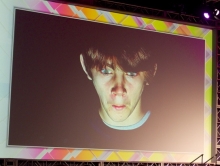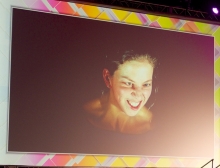Highlights from Educause 2013 #3: Jane McGonigal
Jane McGonigal, the game designer and author of the best-seller Reality is Broken: Why Games Make Us Better and How They Can Change the World gave a wonderful keynote called Higher Education is a Massively Multiplayer Game.
She sees and advocates the incorporation of gaming as possible future for higher education, saying that over one billion people now play games for at least an hour per day. Some people are so committed that they play games like it is their job. Apparently games bring us 10 positive emotions: joy, relief, love, surprise, pride, curiosity, excitement, awe/wonder, contentment and creativity. Games also provide an environment in which it is safe to fail and easy to learn from one’s mistakes.
She said that games also develop a 3:1 (positive to negative emotions) resilience that makes people more productive and successful. She showed some images of resilient gamers on stage like these two:
She also showed some neurological research scans of brains from Stanford that showed the difference between active and passive brains. They were most active when engaged in a game. She said that Play was not the opposite of work, it was the opposite of Depression. Apparently, gaming activates the same part of the brain as a cocaine addiction. It encourages: the mastery of a skill, solving puzzles, driving personal ambition, motivation, the anticipation of rewards, practicing habits, determination and further skill development.
She urged educators to super empower learners about their own ability to succeed in learning by using things like points to complete missions, badges for development of new skills – anything that gives learners a meaningful goal and recognises their achievement. What could be done with a billion gamers on connected devices? What could they do together?
She then spoke of Joi Ito’s belief that students should now be creating knowledge and insight as part of their education, not just learning what is already there. More from Joi Ito (who is Director of MIT’s Media Lab) :
I don’t think education is about centralized instruction anymore. Rather it is the process of establishing oneself as a node in a broad network of distributed creativity.
And those thoughts beautifully flowed on from the sentiments expressed earlier by both Ken Robinson and Mimi Ito.
Jane then illustrated three projects that bring together the concepts of play and acting as a node in a broad network:
- Foldit, from the University of Washington teaches protein folding, building on the fact that manipulation by participants in the virtual space was better than that of super computers because gamers were more skillful and possessed of better spatial intelligence. They knew not to apply brute force. Soon after an invitation to join the project was published in Nature, gamers solved in three weeks a problem with HIV/AIDS that had baffled scientists for over 10 years.
- Evoke (based on Grand Theft Auto?) is a project that helps solve social problems with young people becoming super heroes for the rest of the world. It focussed on youth at university age in Sub-Saharan Africa as a source of solutions not just problems. The aim is to solve real-world problems by making the best use of youth skills and with their collaborators and allies. Blogs, photos and videos were uploaded to prove progress. The World Bank Institute (WBI) provided Social Innovator badges and it resulted in 20,000 students being enrolled from 130 countries. They accidentally ran a MOOC! 50 new social enterprises were funded by the WBI like Libraries Across Africa (now Librii) : a franchise model that is up and running in Ghana now.
- Find the Future is a game that Jane helped to create for the New York Public Library (NYPL) Centennial in 2011. It kicked off with an overnight event that offered 500 places for players (18 and over) to explore the NYPL’s collections for clues locked away in 100 objects that changed history. They had 10,000 applicants. Together the participants put together a collection of stories over night for the NYPL’s rare book collection.
Jane believes the future of education is in a blended environment of gaming, something like MOOCs and live events that allow learners new ways of learning through creative practice anytime, anywhere and in collaboration with others.



